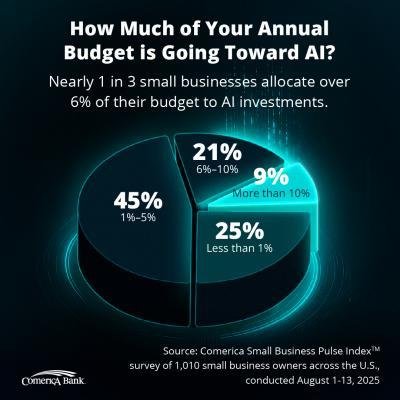DALLAS—Despite economic uncertainty and rapid technological change, small business owners across the U.S. are entering the next 12 months with confidence and optimism, a new report reveals.
According to the first edition of the Comerica Small Business Pulse Index, 81% of surveyed small businesses expect revenue growth, while many are embracing artificial intelligence with both enthusiasm and caution.
The national survey of 1,010 small business owners, conducted Aug. 1-13, reveals they are optimistic about the future, increasingly tech-forward, and calling for thoughtful oversight of emerging technologies.
“Small businesses are the heartbeat of our communities and local economies,” said Larry Franco, executive vice president and national director of retail and small business banking at Comerica Bank. “It’s imperative to be tapped into what’s influencing and impacting small businesses. We launched the Comerica Small Business Pulse Index to do exactly that – identify successes and challenges these businesses are facing right now to help a broad group of entities, from financial providers to consumers and other business owners, better know how to serve, support and strengthen small businesses around them.”
Key findings:
- AI Adoption Is Accelerating: 45% of surveyed small businesses report using AI tools today, with adoption highest in the Technology (64%) and Professional Services (58%) sectors
- Top AI Use Cases: Marketing, content creation, and data analysis are the most valuable applications of AI among adopters
- AI Challenges Remain: Mistakes, tech vulnerabilities, and learning curves are the top concerns for both current and prospective AI users
- Capital Investment (CapEx) Outlook Is Mixed: While 32% of the respondents plan to invest up to $100,000 in the next 12 months, 45% report no CapEx plans. Technology and Construction industries lead in planned investment
- Confidence Is Strong: 83% of surveyed small businesses are confident in their future success, especially those with $500,000+ in revenue and/or 10+ employees
- Inflation Tops the List of Concerns: 23% of respondents cite inflation as the most considerable threat to their business, followed by tariffs and cash flow challenges
AI Regulation And The Road Ahead
“Small business owners see the potential of AI, but they also understand the need for responsible oversight,” said Franco.
While AI adoption is growing, so is the conversation around its governance. Although AI users, as a whole are less likely than non-users to support stricter regulation, those in the Technology and Professional Services industries (which lead in both adoption rate and breadth of use) are actually more supportive of increased oversight compared to AI users in other industries—suggesting those most experienced with AI may also be the most attuned to its potential risks, the report states.
Support for stricter AI regulation also varies considerably by age. Whereas younger business owners are more likely to embrace AI with fewer restrictions, older generations show a stronger preference for oversight. Just 42% of Gen Z respondents favor tighter regulation, compared to 53% of Millennial respondents, 57% of Gen X respondents, and 66% of Baby Boomer respondents, the data show.
“Despite concerns, most small business owners responding to the survey remain optimistic about AI’s impact on employment. A total of 64% of all small businesses surveyed do not believe AI will replace jobs in their industry within the next five years. This sentiment is even stronger among those not planning to adopt AI (74%), with a majority of current AI users (60%) also sharing the same view – indicating a broad confidence in AI as a complement rather than a threat to the workforce,” Comerica said.
Confidence, Capital, And The Growth Horizon
Small business owners are looking ahead to the next year with confidence and momentum, according to the survey. That confidence is especially pronounced among firms with higher revenues and employee counts. Those in operation for four-seven years report the highest levels of optimism, outpacing both younger startups and more established firms.
Market outlooks are similarly upbeat, with nearly two-thirds of respondents expecting conditions to improve. Optimism is strongest in the Midwest and South, where 67% anticipate better conditions, compared to 56% in the Northeast and 60% on the West Coast. Businesses already using AI are also notably more hopeful, with 70% predicting improved market conditions versus 53% among non-users who have no plan to use AI in the near term. The Retail & Wholesale sector, however, reports the lowest optimism, likely reflecting early impacts from tariffs. Among the 14% who foresee a downturn, concerns about tariffs and government policy are twice as common, Comerica explained.
Sales growth expectations are robust, with 81% of the responding small businesses anticipating gains. While 41% project modest growth of 1-10%, nearly 30% expect double-digit increases. The Technology sector stands out as the most bullish, while Retail, Hospitality, and Manufacturing – sectors that also report higher concern over tariffs – show more variability.























































